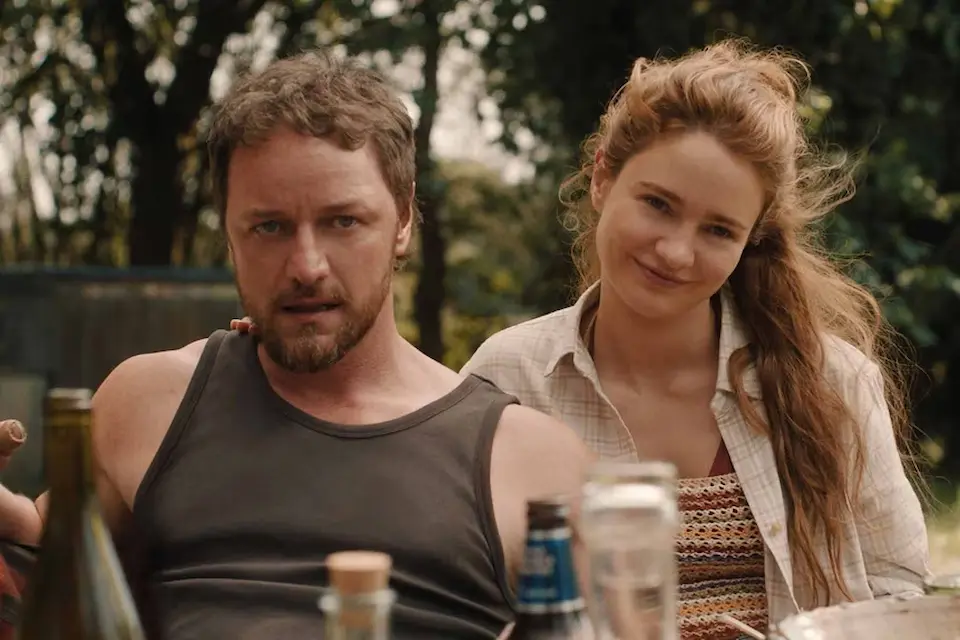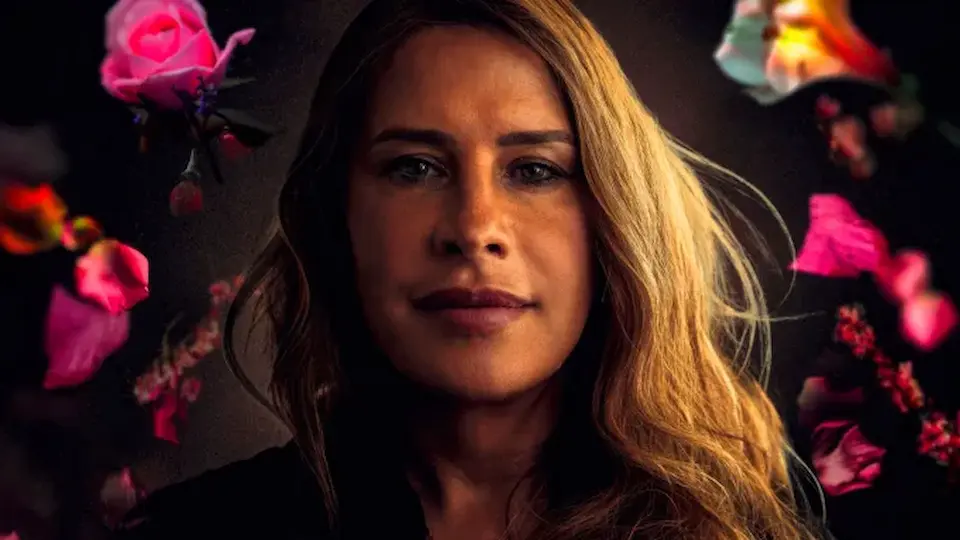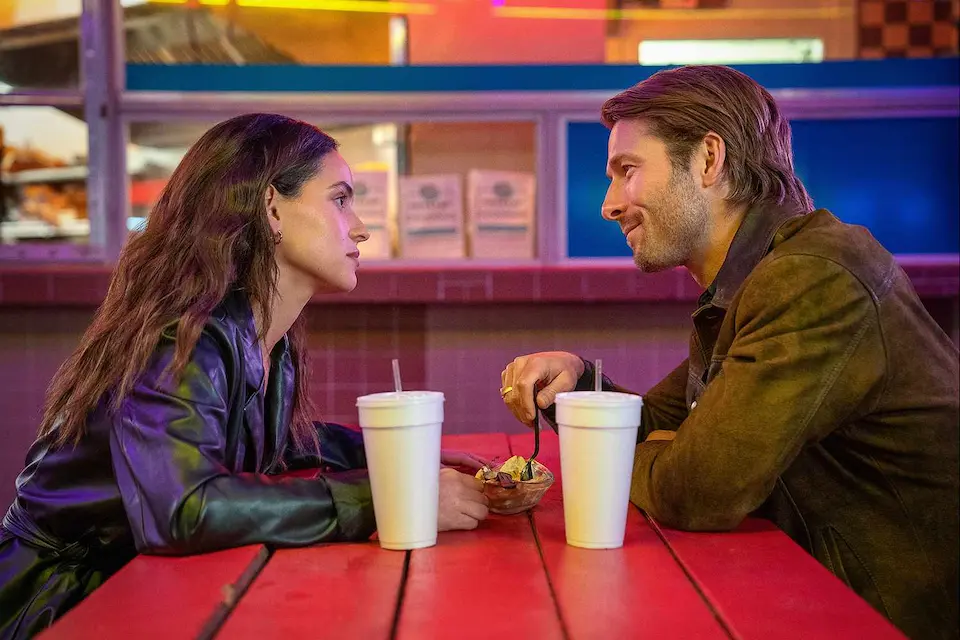Fantastic Beasts: The Rise and Fall of a Franchise
In 2016, the Harry Potter spin-off announced with great fanfare a return to the beloved Wizarding World. But a few years later, little has been left of what promised to be the next big Hollywood franchise. Here is a small tour through all the pitfalls and unlucky events surrounding Fantastic Beasts, and its fall from grace.
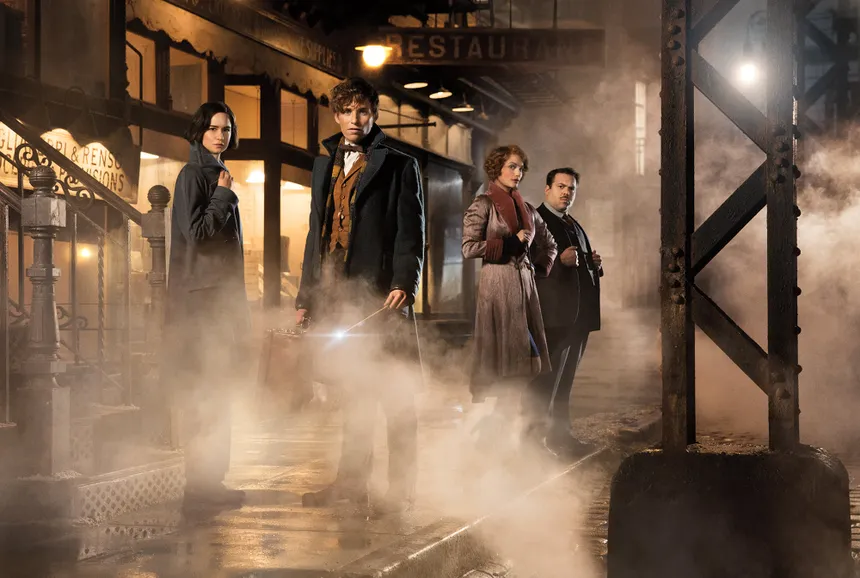
No matter how much time goes by, Harry Potter will always have a special place in my heart. I spent several years during my childhood and early teens submerged in this world, and it wasn’t different with Fantastic Beasts. I became a huge fan of the new story after watching Fantastic Beasts and Where to Find Them, and I had high expectations for the franchise as a whole. My disappointment was immense, and I took the failure a bit too personally.
The first film was revealed to be in production in September 2013. It would be based on the textbook of the same name, mandatory for the Care of Magical Creatures class at Hogwarts, which was mentioned many times in the Harry Potter books and movies. In 2001, J.K. Rowling published an edition of this “textbook” to raise funds for the charity Comic Relief.
The new project would be an original story, with a screenplay written by Rowling herself, about the author of the fictional book, one Newt Scamander. The original plan was to make it a trilogy, but in October 2016, it was reported that the series would comprise five films.
Fantastic Beasts and Where to Find Them (2016)
I didn’t watch the film when it came out, for a simple reason: I was not interested. For me, Harry Potter ended with The Deathly Hallows, and I was satisfied with that. I didn’t want to see something that could potentially ruin the story I had loved so much growing up. It wasn’t until a year later that I decided to give it a chance, and I became invested in the new franchise.
Even though the first time I watched, I felt everything started a little slow, I really enjoyed what was happening on screen. I think one of the biggest assets of the film was that the Harry Potter references were subtle. If you were a fan, you could get excited by identifying a spell, or remembering a creature from Hagrid’s lessons. But someone who had no idea, could easily ignore all those things and enjoy the experience as well. It was a perfect balance between nostalgia and surprise, the old and the new.
The idea of a magical case full of habitats and seeing the protagonist interact with the creatures and take care of them was wonderful. Eddie Redmayne deserves much of the credit for that; his performance as Newt was endearing and fun.
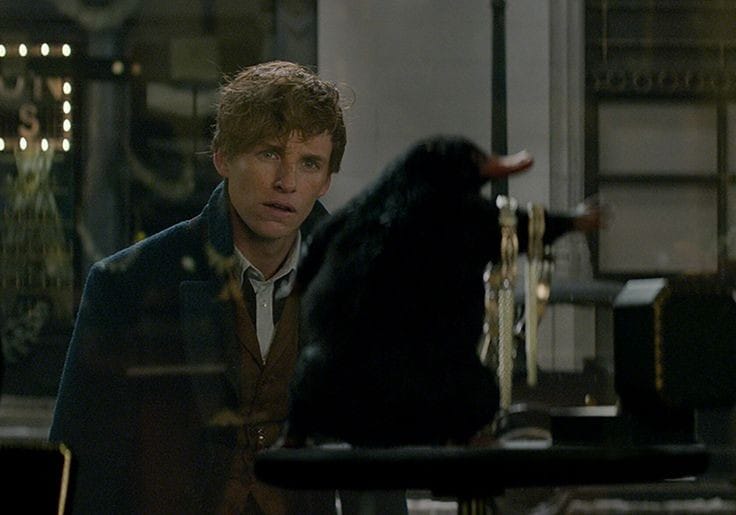
The rest of the cast was great, and it made the dynamic between the group work well. In fact, getting attached to the characters was the main thing that made me want to keep watching.
I saw so much potential. The idea of exploring the magical communities in different parts of the world, following adult characters through the span of many years, and creating a parallelism between what was happening in the magical world and real historical events, was an almost unlimited source of material for stories.
Maybe it didn’t have the level of commercial success Warner expected, given that Harry Potter and the Deathly Hallows: Part 2, the last Wizarding World film to that date, had made over $1.300.000,000 worldwide, but Fantastic Beasts did quite well with $811.724.385. For a first installment, it was very good.
Fantastic Beasts: The Crimes of Grindelwald (2018)
The promotion was very strong for this one. There were a few promotional pictures going around during December 2017, but the proper marketing campaign started in March 2018, with the release of the first teaser trailer. Every couple of days, there was some new information, picture, or interview with the cast, and fans were full of enthusiasm.
It was maybe in part because the amount of references and clues linking the story to Harry Potter had increased, in an attempt to attract more of the older fans, who had not shown any interest in the new franchise. At that moment, it was exciting, but this marketing strategy would later prove to be a huge misstep for the project. Too much information was revealed beforehand.
When the day of the release came, it became evident that the film was not what we’d been sold.
Everything that, in my opinion, made the first one great, was taken away. Instead of four protagonists, there were three hundred new characters that did not have much screen time; some didn’t even have much relevance to the plot. Most things regarding Newt, Tina, Jacob, and Queenie were not even explained, as if they lacked importance.
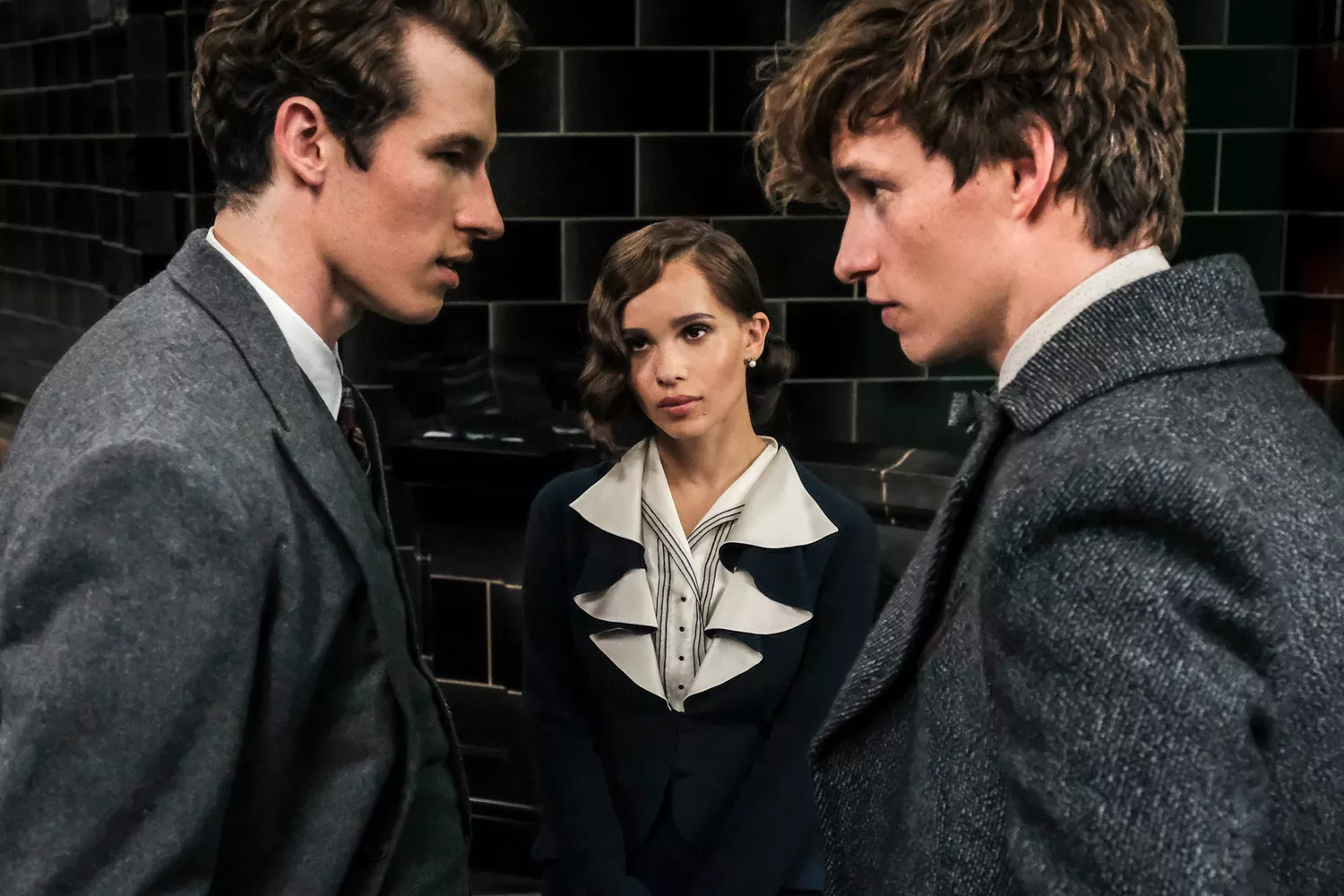
Queenie’s storyline was one of the most questionable, not because the twist in her fate was not interesting, but because it was never correctly developed. And this mistake also impacts the characters of Tina and Jacob, even though they have their own problems.
Many details that were revealed in the trailers, such as the participation of well-known characters such as Dumbledore, Nicolas Flamel or Nagini, made us think that their part in the story was going to be a bigger one, but the truth is that we barely get to see them.
The Harry Potter references were everywhere. It looked wonderful in the trailers, but most of them didn’t make a significant contribution to the story. Characters and elements “magically” appeared where the plot needed them, ignoring whether it made sense or not.
The Lestrange Family Plot Line
A big part of the running time was taken by Leta Lestrange, a character whose story was supposed to give us some insight into Newt’s childhood and the reasons he became the person he is, and create tension with his older brother, who was Leta’s fiancé. Or at least, that was what they made us believe. Leta has a story of her own, that appears to be connected to the mystery of Credence’s identity, but ends up having nothing to do with it. So we wasted two hours on a plot line that didn’t take us anywhere. And then the character just dies.
In general, there was no plot. There were just a lot of unrelated clips that the director stuck together and embellished with special effects. The cliffhanger was lousy. No one believed Credence was Dumbledore’s brother.
There was no emotion. The bigger scenes didn’t feel moving. Suddenly, instead of making the most of what had been built in the first installment, it was about reviving Harry Potter.
Hiatus (2019-2021)
Even though The Crimes of Grindelwald’s numbers were not bad, there had been an evident decrease in the franchise’s profitability, if the box office numbers were to be considered. The first movie had made $811.724.385 worldwide, while The Crimes of Grindelwald only reached $648.455.339, according to The Numbers. The huge marketing campaign and an increase in the production budget compared to its predecessor make it very clear that the studio was expecting way more from it. It made money, but it underperformed.
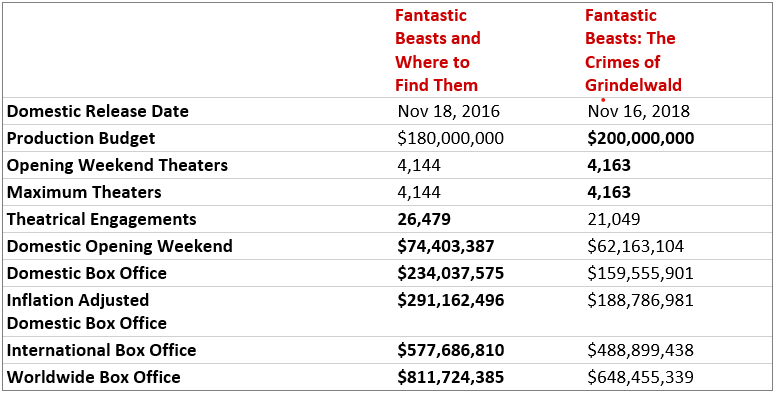
What really seemed to set off the alarms was the negative reception from audiences and critics alike. To this day, The Crimes of Grindelwald is the Wizarding World movie with the worst score in Rotten Tomatoes, only 38% from the top critics. Back in 2018, the “verified audience” concept didn’t exist on the website, and the whole audience score was 53%.
All this forced the studio to reconsider their approach. A few months after the release, in early 2019, Warner Bros. announced what would be the first delay. Instead of November 2020, the third installment would reach theaters a year later, in November 2021.
Additionally, that same year, it was announced that the location for the third film would be Brazil (to the excitement of Latin American fans), that the start of production was scheduled for spring 2020, and that Steve Kloves, who has previously served as a screenwriter on some of the Harry Potter films, was going to be part of the project as a co-writer.
Little did we know, that this delay would be the beginning of a series of unfortunate events and scandals, that would help sink what, I still believe, could have been a good franchise.
J.K. Rowling’s Fall From Grace
First, we have the well-known J. K. Rowling’s Twitter controversies, which I believe started in late 2019, when she took a public stance in Maya Forstater’s case. It was in June of the next year that some of her tweets opposing gender ideology caused major backlash. The situation had many consequences, but the most relevant to the topic of this article is the division it caused in the Harry Potter fandom. A number of fans who disagreed with Rowling, and considered her views “hateful” and “harmful”, started pushing for a boycott of Wizarding World products, including, of course, the Fantastic Beasts franchise.

The lockdowns due to the pandemic also played a part. Principal photography for the third film was scheduled to begin in March 2020, but it had to be postponed. Filming ended up starting in late September of that year.
Johnny Deep vs. Amber Heard
In November 2020, Johnny Depp announced he had been asked to resign his role, due to the negative publicity resulting from his defamation lawsuit against the newspaper The Sun. A few days later, Warner Bros. announced he would be replaced by Mads Mikkelsen in the role of Grindelwald. This was another point of division for the fandom. Some fans were furious that Depp was being let go by Warner with no contemplations, while Amber Heard was still part of some studio projects, and they started a campaign for the actor to return. But there was also a group that defended Mikkelsen’s casting, alleging that Depp had never been a good fit for the role in the first place.
Following Depp’s departure, and after all the scheduling problems caused by the pandemic, Warner Bros. decided to delay the release once more, to July 15, 2022.
The Tina Problem
As early as mid-2021, there were already plenty of rumors about Tina Goldstein’s role (played by actress Katherine Waterston) being diminished to barely a cameo in the new movie. J. K. Rowling’s drama was still in a very high moment, and some pointed at her, the screenwriter, as guilty of that, as some sort of revenge against the actress for opposing her publicly. It was known that Waterston had been sick during the first months of the pandemic, so people speculated that her health could possibly be the reason. Scheduling conflicts were also a possibility. The real reason behind this decision was never made public, but the complete absence, not only of the actress, but of the character, in the promotion of the film was striking, especially considering she played an important role in the franchise.
In the meantime, other issues that were not directly linked to the production came to light.
Ezra Miller and Kevin Guthrie
Ezra Miller, who played Credence Barebone, had an erratic conduct for a long time, and the resurface of a video that showed him choking a woman was a scandal in early 2020. Many other incidents in which the police had to get involved were made public during 2022, some before the movie was released. Also, Kevin Guthrie, who played Abernathy in the first two films, was fired due to his trial an eventual conviction in a sexual assault case.
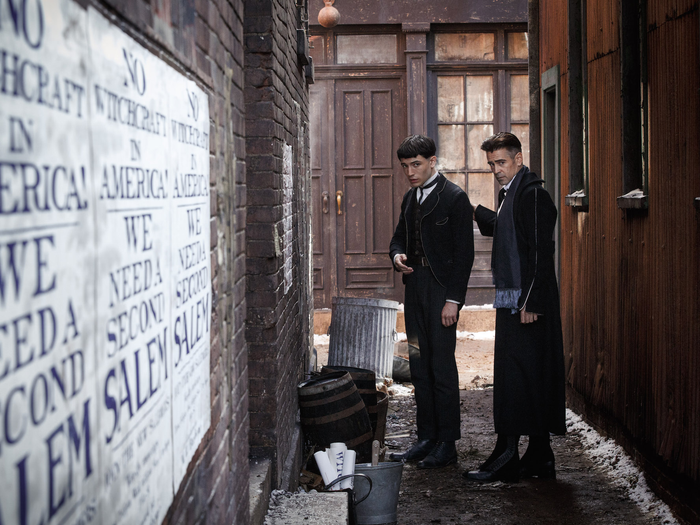
With all these situations, interest in the films decreased drastically between late 2020 and early 2021. There was almost no news on the production’s development, and the few things that were rumored online were not encouraging.
In September 2021, the title of the third film was announced, and the release date was unexpectedly pushed forward three months, to April 15 2022.
The first promotional material dropped in December, a little over three months before the theatrical release, marking a huge difference from the first two installments, which had big marketing campaigns.
And if all of that wasn’t enough, in December 2021, a rough outline of the script was leaked on Twitter. It was supposedly submitted by a person who had attended a screen test months prior. The content of said material was messy and disappointing, and unfortunately (as we would find out in April) very accurate to what The Secrets of Dumbledore ended up being.
After a few weeks of promotion that can only be described as underwhelming, April came at last, and it was time to watch the object of so much trouble in theaters.
Fantastic Beasts: The Secrets of Dumbledore (2022)
I think this movie had two tasks: the first was establishing the way of the story and setting the ground for what was coming, and the second was correcting and filling in all the plot holes and mistakes of its predecessor. Unfortunately, it did none of that. In fact, it did the exact opposite.
The plot was a real mess. It was clear in the second movie that the main problem was the quality of the script. Steve Kloves, known for writing the scripts for some Harry Potter movies, was brought in, in what many fans considered a necessary improvement to Rowling’s previous work. The truth is, in spite of all the pains they took to assure the audience, the main issue of the new movie continued to be the script.
The production, the costumes, and the special effects were wonderful. The cast was great. But instead of accompanying those things, the script took the shine away from them. The actors did what they could with what they were given, but their true potential was truly wasted in a plot full of conveniences and poor development.
Character Assassination
Newt and Tina’s relationship, the highlight of The Crimes of Grindelwald’s promotion and the main couple, was left hanging. Tina didn’t even take part in the adventure. She was given a nonsensical promotion in her career to keep her apart from the group, and she made a brief appearance in the finale.
Queenie’s shocking decision to join Grindelwald, a major act of betrayal, is treated as a small mistake. She faces no consequences. The people she left behind are alright with it, and she can fulfill her dream of getting married in America, even though the laws forbid it. Whether the country changed the laws, or they got married in spite of that, is something we’ll never know.
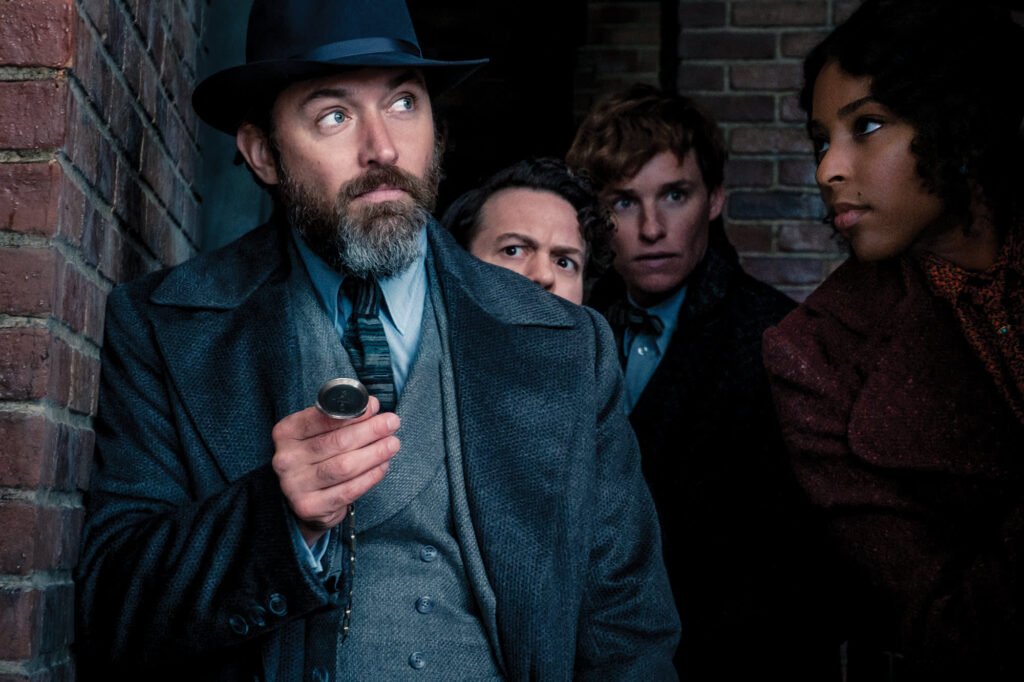
I love Jacob. Everybody wants a friend like him. But the bad script also suffocated his character. His interventions weren’t as funny as they used to be, and his reconciliation with Queenie was way too forced.
Newt is just there. There’s nothing to say about him. He is a side character who is there to make the story move, and be Dumbledore’s assistant. He was given some cool scenes with the magical creatures, but as a character, he experiences no change or trial.
And bringing in new characters only highlighted how little was left from the first movie.
We Were Promised Revelations
Despite the title, we don’t discover any secrets about Dumbledore in the two-hour and a half running time. Everything the movie tells, we already knew or imagined, so no surprises there. Jude Law and Mads Mikkelsen are great actors, but there’s nothing they can do to elevate the project.
The ending is rushed and leaves you dissatisfied. You watched for more than two hours, and nothing happened. The people involved didn’t want to be there anymore.
Years after the release, I still can’t believe that many of the fan theories that I read online between movies were infinitely superior to the final product, and showed way more care and respect for the characters and the source material than the creative team. When you’re a professional in your field, and amateur writers online, posting from their phones, can do better than you, it’s obvious you have a problem.
Who is your audience?
The way people in charge of productions ignore this point never ceases to amaze me. If you don’t know who your main audience is or what demographic you should be pointing at, releasing movies becomes a matter of hit or miss.
Maybe the best examples in the past few years are the superhero movies, especially the Marvel ones. Even though they know that their audience is, and has always been, mostly male, they insist on making the franchise about female empowerment, and making men look like idiots. Then they wonder why those movies flop.
In this case, the audience could be divided into two groups.
The first group is formed by people who have been following Harry Potter since the books and movies were released, people who are now adults. For this audience, you need a more complex and sophisticated plot, more careful character development, and, of course, the most complete accuracy regarding the wizarding world’s rules and laws. It’s not necessary to show direct references to Harry Potter or to bring well-known characters just for the sake of it. Little clues and references are much better to capture the old fans’ attention, and make them want more.
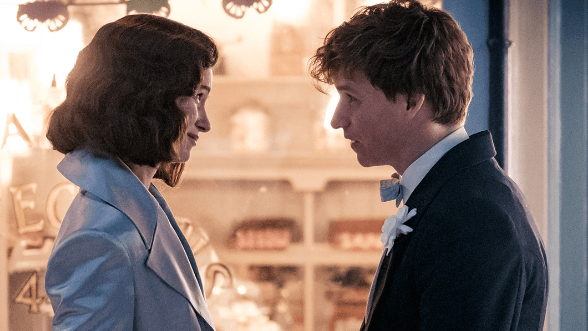
The other group is formed by children and teenagers who do not know much about Harry Potter, but could potentially become fans and consumers of future projects. For them, you need the plot to be entertaining, easy to follow, and work as a stand-alone product. It should be a good way to introduce them to the Wizarding World, and get them interested in the original books and films.
While a more adult project could be interesting, I believe it’s more than possible to find some middle ground and create something that can appeal to both groups. In fact, some adults in the first group are parents, and would love to share something that was so dear to them growing up with their children, who are part of the second group. So if you play your cards right, your audience keeps growing.
Spoiler: They did not. Unless the objective was to make the franchise as unappealing as possible for everyone. The last movie, in particular, is an example of how to take a profitable IP and make it as unpalatable and generic as possible. It makes no sense, and it disrespects everything established by the previous films and the Harry Potter books, so adults fans won’t care about it, and it’s also boring and long, so children will fall asleep.
Scripts Need To Improve
Most people would say this is an issue because J. K. Rowling doesn’t know how to write scripts. Which is probably true; writing a script is quite different from writing a novel. I enjoyed the first film, but in The Crimes of Grindelwald, it became obvious that the number of characters and storylines had become unmanageable. Creating the space to develop each of them without neglecting others or destroying the story’s cohesion requires a level of skill and experience with the format.
What puzzles me is the fact that no one noticed the deficiencies in the script before the movie started production. Rowling is not an expert in filmmaking, but there was a team of producers, creatives, and, of course, the director. No one realized it needed improvements?
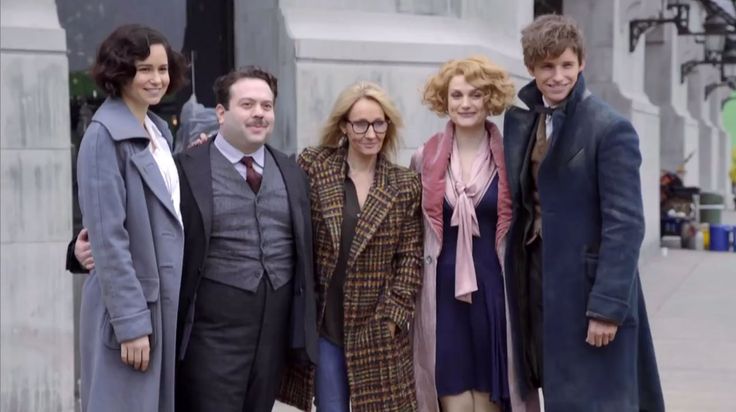
Also, it’s not unusual in big productions for the script to experience plenty of changes as it moves forward. More than once during interviews, the actors themselves said that they shot different versions of the same scene, or that some things were last-minute changes they didn’t know about. That’s why I believe there is more than one person who should share the blame with Rowling. She was not the only problem. And I think this became evident in The Secrets of Dumbledore.
Steve Kloves was hired to improve the screenplay, and the film was still a disaster. Maybe it wasn’t as chaotic in its structure as The Crimes of Grindelwald was, but it committed a more unforgivable sin, that has become all too common in the film business: the person who wrote that script had not watched the previous films.
I don’t know how many modifications Kloves made to Rowling’s original idea, but the third film feels completely disconnected from the other two. Everything that was established about the characters and the general story was discarded. And it’s a huge problem, because it makes the previous films seem pointless. If they wanted to tell us about Dumbledore, why didn’t they make him the protagonist from the beginning? Why were we introduced to all these people and spent more than four hours learning about them if they were never important?
How to Ruin Your Characters
I could go into detail about all the crimes committed in terms of character development. Through three films, the creatives were consistent in one thing: destroying each character’s storyline in the most absurd and anticlimactic way possible. The four protagonists introduced in the first film were the main victims of this, for they were somehow established before everything went to hell in the second one.
The people making these movies do not seem to understand that even though the spells and the world-building were essential, they were not what made Harry Potter magical. All those things were incredible because of one thing: the characters. Going through the books, or through the movies, watching them grow, mature, fight their fears and insecurities, and get to know love and loss. We had Harry, Ron and Hermione, whose adventures and tales of their daily lives were interesting because we have come to love them.

Even characters you could consider not central to the main plot, were developed through the years, and that created an emotional attachment to the audience. Think about The Deathly Hallows, and the number of characters that were not protagonists, but whose deaths were deeply emotional. It’s been years, and my heart still breaks every time I read or watch Dobby’s death.
The characters are the soul of any story, and building them carefully is the secret of any good tale. No matter how many special effects you have, or how much you appeal to nostalgia, at the end of the day, if the audience can’t feel a true connection to your characters, things won’t feel epic. The story loses its soul.
Actions Have Consequences
And Warner found out. At the moment The Secrets of Dumbledore came out, expectations were already low. It must be considered that the franchise’s future had been hanging from a thread ever since 2018, so the box office results for the third installment were a death sentence. We can tell for sure, that this time around, they lost money.
They were frugal with the marketing campaign (probably knowing it was not worth the investment), but the delays, and the rumors of numerous reshoots leave me wondering how much money Warner had to pay for its own mediocrity.
The Secrets of Dumbledore couldn’t even reach $100.000.000 in the domestic market. In fact, if we compare its worldwide box office of $404.560.145 to that of Fantastic Beasts and Where to Find Them, we can observe that the first film made twice as much money. Without considering inflation, it’s clear that a substantial part of the audience left halfway through the story.
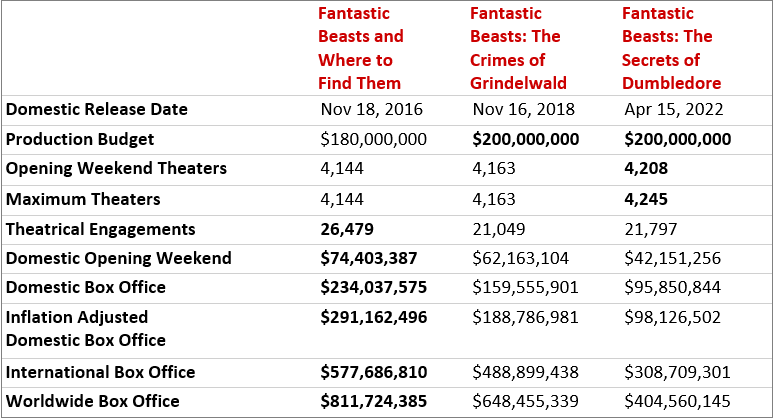
The people who took the time to watch the film, did not have a lot of good things to say about it, except praising the actors, especially Mads Mikkelsen and Jude Law, for their performances. The critic’s verdict was not as terrible as with The Crimes of Grindelwald, but it was by no means encouraging.
Is There a Future?
The last news available about this franchise are some declarations David Yates, the director of all three films, made in a podcast at the end of last year, assuring that he hadn’t spoken to anyone involved in the project, and that they were “taking a break”.
And it seems this “break” is going to be eternal. To this date, Warner has manifested no intention to continue developing Fantastic Beasts, which is no surprise. Financially, they can’t expect to succeed if they choose to make a fourth part, and in terms of plot, The Secrets of Dumbledore destroyed any possibility of saving the story.
The worst is that, instead of getting more fans, they have discouraged the already existing ones from watching any future Harry Potter-related projects as well. It’s clear that they cannot elaborate more than what has already been told. It will be years before I can take the sour taste of this experience out my mouth.
They had the chance to create something new, to disentangle themselves from Harry Potter, and to give the public something fresh, that could gather just as much love—something that could shine on its own. Instead, they decided to sell us a “magical aesthetic” with no substance.
Fantastic Beasts has come, from being a promising story, to just one more mediocre prequel.

